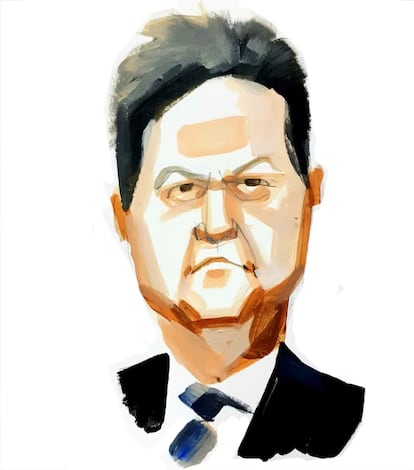The only man who claims credit for the invention of Bitcoin goes to trial
A London court is hearing the case of computer engineer Craig Wright to determine if he is in fact behind the pseudonym Satoshi Nakamoto, the creator of the digital currency

It was he who invented Bitcoin, he says. Otherwise, why has nobody else come forward claiming to have done so yet? That is the main argument of the Australian computer scientist Craig Steven Wright, who these days is defending in the London courts, against the crypto sector organization COPA, the claim that is the person behind the pseudonym Satoshi Nakamoto.
The Crypto Open Patent Alliance (COPA), whose members include Twitter founder Jack Dorsey’s payments company Block, wants the court to stop Wright from suing Bitcoin developers and preserve its open source nature. The computer scientist publicly stated in 2016 that it was he who created Bitcoin and that this gives him rights over it; since then, he has been involved in multiple legal conflicts.
Wright maintains that he is the author of a 2008 white paper, published under Nakamoto’s signature, that is the founding text of Bitcoin as well as other cryptocurrencies. COPA states that he has never provided any authentic evidence and accuses him of repeatedly altering documents. Wright blames others, including former lawyers and partners, for the forgeries.
COPA’s lawyer, Jonathan Hough, noted at trial that “there are elements of Dr. Wright’s conduct that stray into farce,” such as the alleged use of ChatGPT for the forgeries. COPA claims, for instance, that one text contains a manipulated timestamp, with numbers in visibly different fonts to make it appear to predate the Bitcoin white paper. Wright response was: “If I forged that document, it would be perfect.”
Wright studied the engineering career at the Charles Sturt University (Bathurst, Australia) while, he says, he simultaneously trained as a chef. His doctorate was titled The Quantification of Information Systems Risk. He also says that he has another doctorate, this one in theology, comparative religious and classical studies, awarded in 2003 by the United Theological College (Bangalore, India).
He worked — always according to his story — in information technology for several companies, including internet provider Ozemail, K-Mart and the Australian Stock Exchange, in addition to working as a security consultant for the Indian automotive multinational Mahindra & Mahindra. He claims that he designed the architecture of what was possibly the world’s first online casino, Lasseter’s Online, launched in 1999, and that he was director of information systems at the accounting firm BDO Kendalls.
He founded the company DeMorgan Information Security Systems, from which he resigned in 2003. A year later, he was found guilty of contempt by the Supreme Court of New South Wales and sentenced to 28 days in jail for breaching a court order preventing him from approaching DeMorgan’s clients. The sentence was suspended on condition that he did 250 hours of community service. He also founded the technology company Hotwire Preemptive Intelligence Group, which planned to launch Denariuz Bank, the world’s first Bitcoin-based bank, but it went bankrupt in only a year.
In 2015, parallel investigations by the specialized media outlets Wired and Gizmodo suggested that Wright could have been the inventor of Bitcoin. However, later reports from those and other publications raised the possibility that it was all in fact an elaborate hoax. Hours after Wired published its allegations, Australian police raided Wright’s home over a tax investigation. The computer scientist promised to provide “extraordinary proof to an extraordinary claim,” but experts believe that so far he has not provided definitive proof, such as Nakamoto’s private cryptographic key.
In 2019, Wright stated he created Bitcoin with Dave Kleiman and Hal Finney. The former had sued him in Florida in 2018 over rights to Bitcoin worth more than $5 billion, alleging that Wright had defrauded him in of the currency and intellectual property rights. In 2019, a judge ruled that Kleiman owned half of the Bitcoin he mined with Wright between 2009 and 2013, and ordered him to transfer half of the company’s intellectual property, but it did not address the issue of whether Wright was Satoshi Nakamoto or not. “The story defies common sense and real-life experience,” the judge declared.
Wright, however, believes that this and other sentences against him are actually arguments in favor of his main claim. He also defends himself with the argument that no one else has claimed to be Nakamoto. The hearing began last week and will last five weeks.
Sign up for our weekly newsletter to get more English-language news coverage from EL PAÍS USA Edition









































